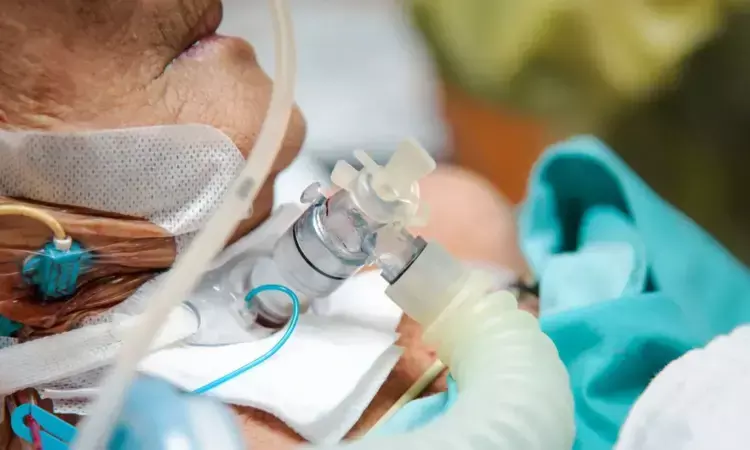- Home
- Medical news & Guidelines
- Anesthesiology
- Cardiology and CTVS
- Critical Care
- Dentistry
- Dermatology
- Diabetes and Endocrinology
- ENT
- Gastroenterology
- Medicine
- Nephrology
- Neurology
- Obstretics-Gynaecology
- Oncology
- Ophthalmology
- Orthopaedics
- Pediatrics-Neonatology
- Psychiatry
- Pulmonology
- Radiology
- Surgery
- Urology
- Laboratory Medicine
- Diet
- Nursing
- Paramedical
- Physiotherapy
- Health news
- Fact Check
- Bone Health Fact Check
- Brain Health Fact Check
- Cancer Related Fact Check
- Child Care Fact Check
- Dental and oral health fact check
- Diabetes and metabolic health fact check
- Diet and Nutrition Fact Check
- Eye and ENT Care Fact Check
- Fitness fact check
- Gut health fact check
- Heart health fact check
- Kidney health fact check
- Medical education fact check
- Men's health fact check
- Respiratory fact check
- Skin and hair care fact check
- Vaccine and Immunization fact check
- Women's health fact check
- AYUSH
- State News
- Andaman and Nicobar Islands
- Andhra Pradesh
- Arunachal Pradesh
- Assam
- Bihar
- Chandigarh
- Chattisgarh
- Dadra and Nagar Haveli
- Daman and Diu
- Delhi
- Goa
- Gujarat
- Haryana
- Himachal Pradesh
- Jammu & Kashmir
- Jharkhand
- Karnataka
- Kerala
- Ladakh
- Lakshadweep
- Madhya Pradesh
- Maharashtra
- Manipur
- Meghalaya
- Mizoram
- Nagaland
- Odisha
- Puducherry
- Punjab
- Rajasthan
- Sikkim
- Tamil Nadu
- Telangana
- Tripura
- Uttar Pradesh
- Uttrakhand
- West Bengal
- Medical Education
- Industry
Swallowing ability crucial for decannulation of tracheostomy in traumatic brain injury, reveals study

Denmark: In the realm of critical care medicine, the process of decannulation, or removal of a tracheostomy tube, represents a significant milestone in the recovery journey of patients, particularly those who have sustained severe traumatic brain injuries (TBI). A recent study published in Respiratory Care has unveiled crucial insights into the factors associated with the time to decannulation in this vulnerable patient population.
The study found that in moderate to severe traumatic brain injury patients with tracheostomy, improved swallowing ability within the initial four weeks of rehabilitation was linked to an 8.2-day decrease in time to decannulation, while enhanced overall sensorimotor ability correlated with a reduction of 0.94 days.
The researchers noted that pneumonia was associated with a substantial increase in decannulation time by 24.4 days.
Prolonged tracheal tube placement following severe TBI can cause severe complications. Safe removal requires sufficient ability for independent breathing and airway protection. Thus, for safe and efficient weaning, identifying important factors for time to remove the tracheal tube (decannulation) is essential.
Against the above background, Signe J Eskildsen, Aarhus University, Health, Department of Public Health, Aarhus, Denmark, and colleagues aimed to identify significant factors for time to decannulation in a Danish population of subjects with tracheostomy after TBI in a retrospective register-based cohort study.
For this purpose, the researchers selected subjects with moderate and severe TBI and a tracheal tube from the Danish Head Trauma Database between 2011 and 2021. Time to decannulation was calculated as the time from injury to decannulation.
The following were the study’s key findings:
- 324 subjects were included with a median of 44 d to decannulation.
- The primary analysis found that an improvement in swallowing ability during the initial 4 weeks of rehabilitation was associated with an 8.2 d reduction in time to decannulation.
- Change in overall sensorimotor ability reduced time to decannulation by 0.94 d.
- Change in cognitive abilities from rehab admission to 4-week follow-up did not significantly affect the number of days to decannulation.
- Secondary analysis showed pneumonia was associated with the largest estimated increase of 24.4 d and that increased cognitive functioning at rehabilitation admission was associated with a significant reduction in time to decannulation.
In conclusion, the study found that a change in swallowing ability is a potentially significant factor in reducing time to decannulation. Identifying factors that could explain differences in time to decannulation is essential for patient outcomes, particularly, if these factors are modifiable and could be targeted in treatment and rehabilitation.
Reference:
Eskildsen SJ, Hansen CA, Kallemose T, Curtis DJ, Wessel I, Poulsen I. Factors Associated With Time to Decannulation in Patients With Tracheostomy Following Severe Traumatic Brain Injury. Respir Care. 2024 Apr 22;69(5):566-574. doi: 10.4187/respcare.11376. PMID: 38649274.
Dr Kamal Kant Kohli-MBBS, DTCD- a chest specialist with more than 30 years of practice and a flair for writing clinical articles, Dr Kamal Kant Kohli joined Medical Dialogues as a Chief Editor of Medical News. Besides writing articles, as an editor, he proofreads and verifies all the medical content published on Medical Dialogues including those coming from journals, studies,medical conferences,guidelines etc. Email: drkohli@medicaldialogues.in. Contact no. 011-43720751


